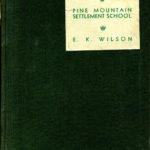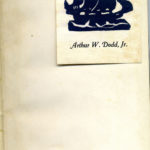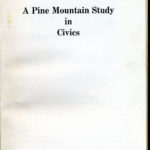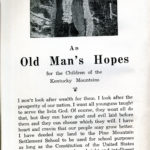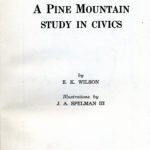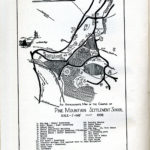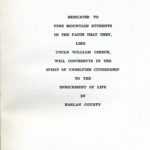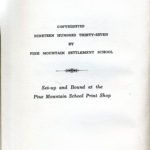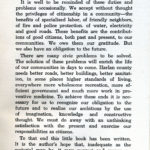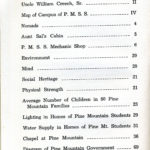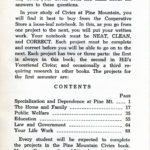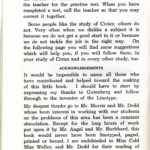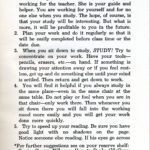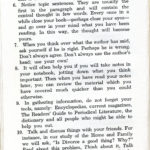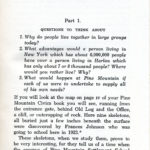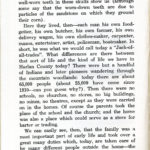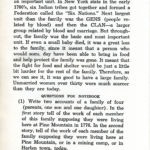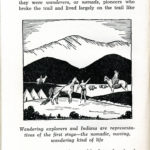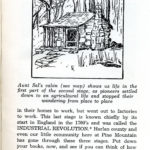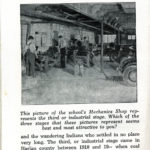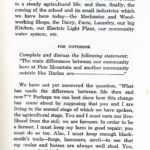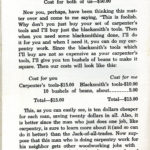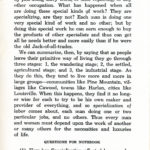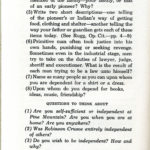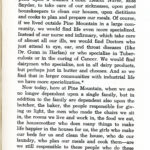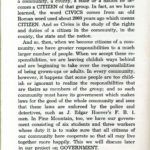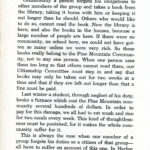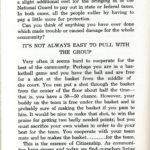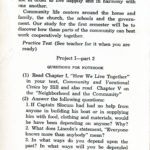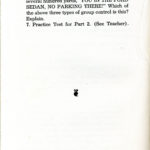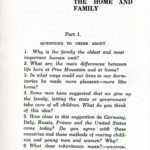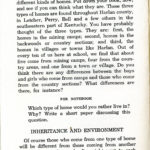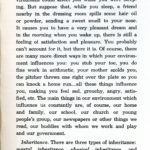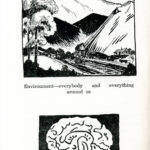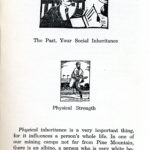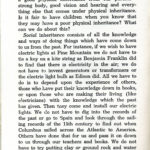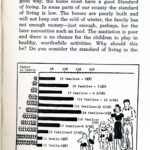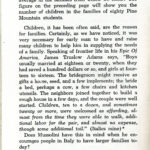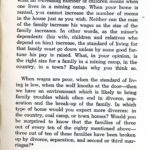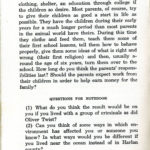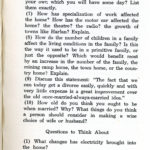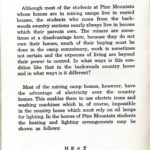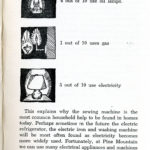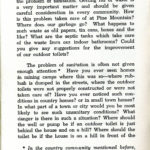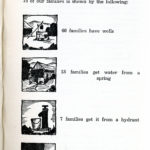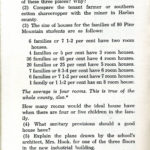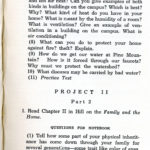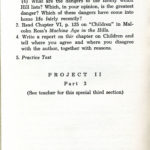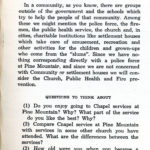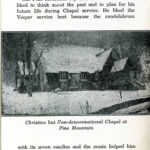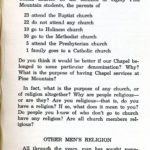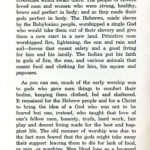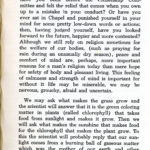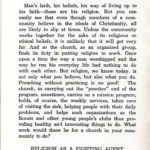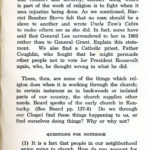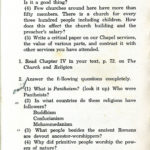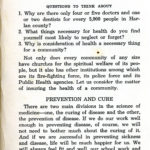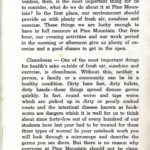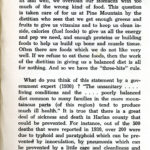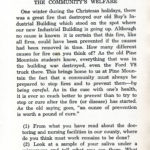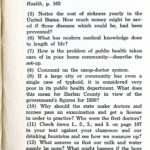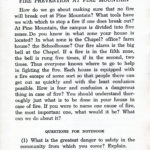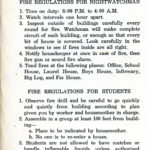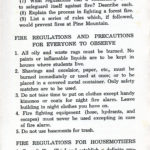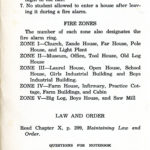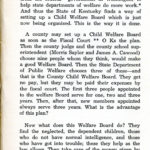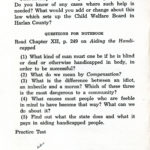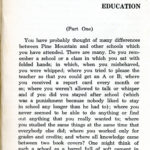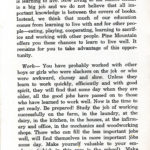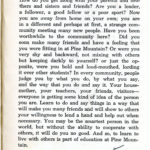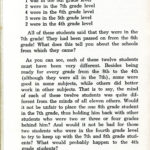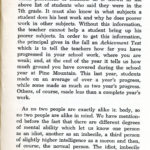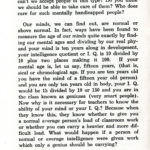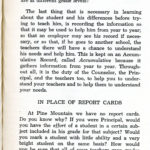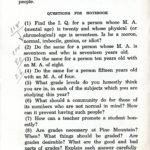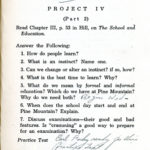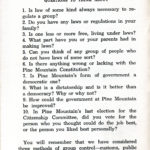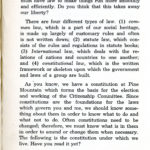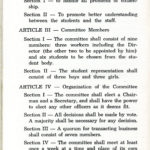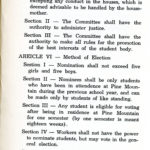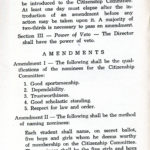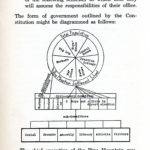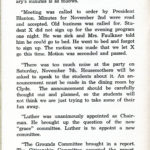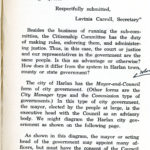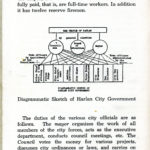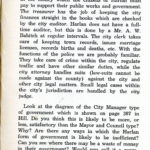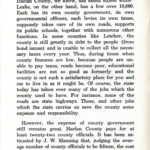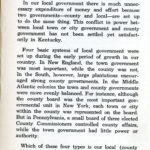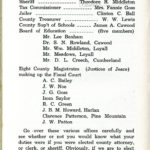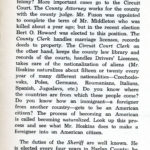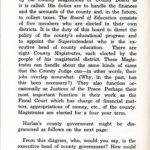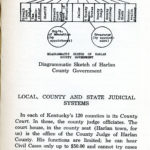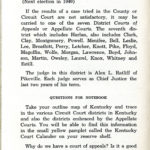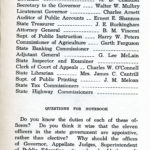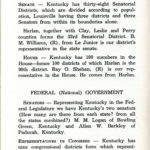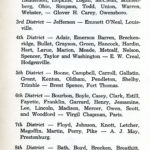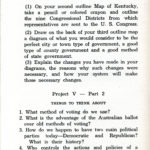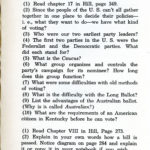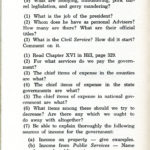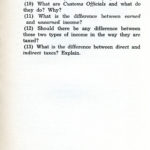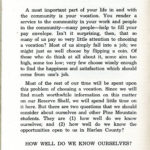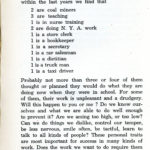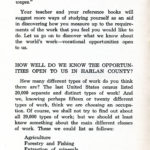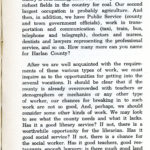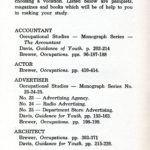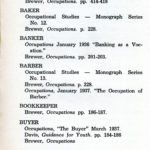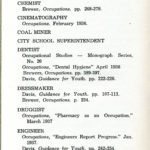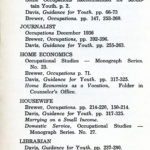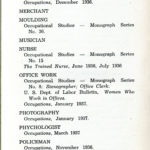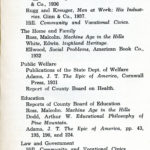Pine Mountain Settlement School
Series 09: BIOGRAPHY – Staff
Series 17: PUBLICATIONS PMSS
Everett K. Wilson
A Pine Mountain Study in Civics
1937
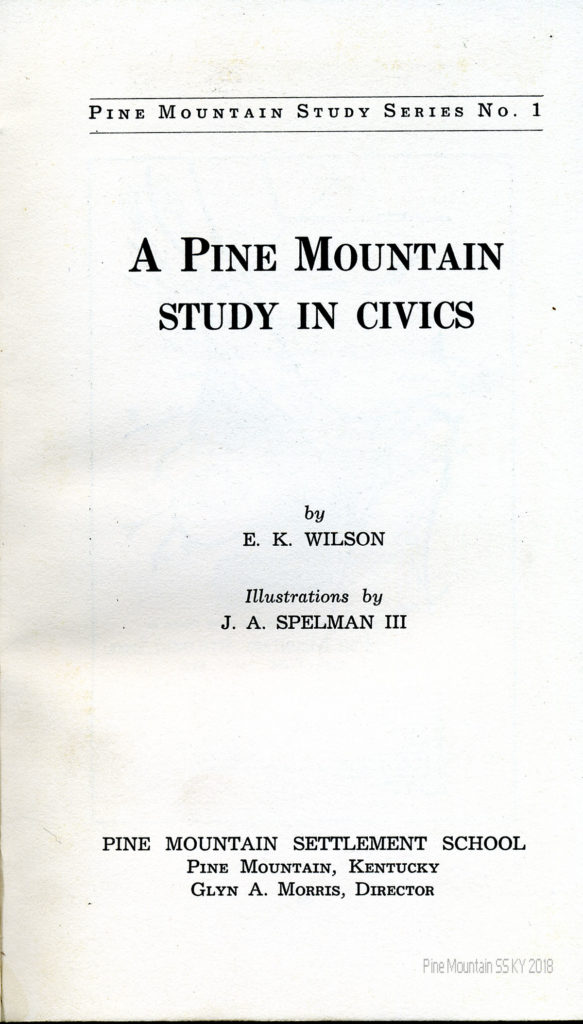
“A Pine Mountain Study in Civics” by Everett K. Wilson, 1937. Title Page. [study_civics_04title_pg.jpg]
EVERETT K. WILSON A Pine Mountain Study in Civics 1937
TAGS: Everett K. Wilson, John A. Spelman, III, PMSS publications, A Study in Civics, A Pine Mountain Study in Civics, vocational education, government, curricula, rural communities, John Dewey, Glyn Morris, Arthur W. Dodd, Jr., August Angel, Fred J. Burkhard
In 1937, when A Study in Civics was written, Everett K. Wilson (1913-1999) was a young teacher just feeling his way in the educational program at the School. This small book published while Wilson was an intern in the Antioch College instructor program at Pine Mountain, grew from Wilson’s training in the field of sociology at Antioch in Ohio. It was eagerly welcomed as a concise guide for the students at Pine Mountain where civics was a core requirement of all students. Copies of the guide were reproduced by the school’s print shop under the direction of August Angel and Fred Burkhard. It included block prints by resident artist John Spelman III and strong endorsement by the School’s director, Glyn Morris.
Pine Mountain was Wilson’s first teaching experience as an intern in the Antioch practice teaching program and when he left the School two years later he went on to a doctoral program at the University of Chicago and later to a faculty position at the University of North Carolina. He became one of the leading scholars in the field of sociology and a leader of the American Sociological Association. Even in his brief time at the School he left a remarkable legacy in the many lives he touched and changed.
A Study in Civics: DESCRIPTION
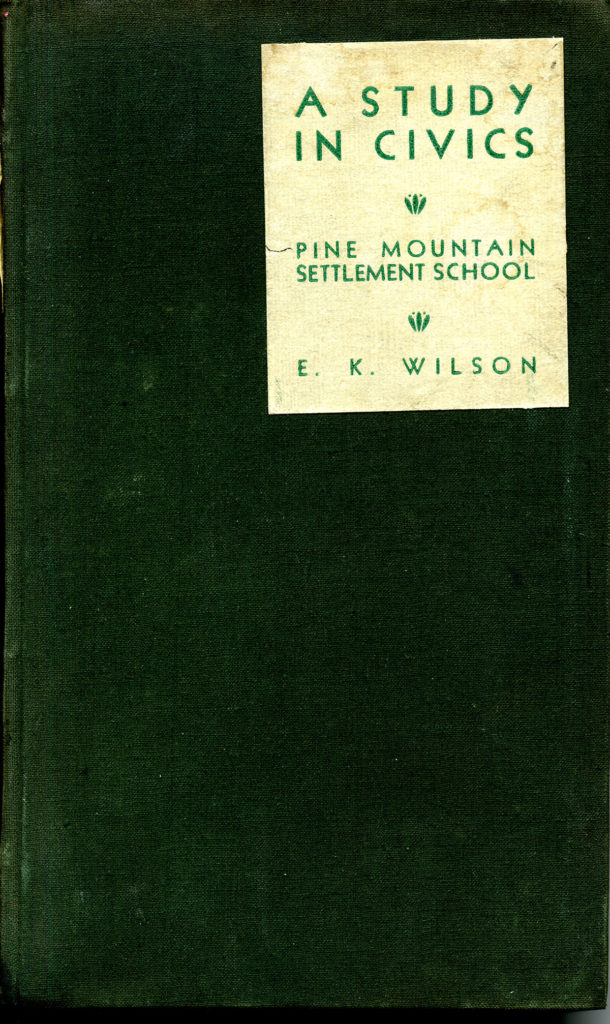
“A Study in Civics” by Everett K. Wilson, 1937. Cover. [wilson_study_cover.jpg]
The printing of the book, guided by printing instructors August Angel and Fred Burkhard, was part of the robust vocational education program offered to the students. This small 97-page book belonged to Arthur W. Dodd, Jr, the PMSS School Principal. He read the original manuscript and offered critique and suggestions on the first draft and later used the text when he taught the same class to students at the School. The book contains Dodd’s brief annotations and his book-plate.
This is a tool for educating good citizens to engage their civic responsibilities. Today stand-alone civics courses rarely show up in the general high-school curriculum and certainly, few are mapped so carefully to their specific community. Today it is also rare to find any secondary course as compulsory and comprehensive as this small book which is focused on a cohort experience. All students at Pine Mountain were compelled to take the civics course during their Boarding School years. The course follows the developing county-wide educational goals which were explored and ultimately integrated into the development of the Rural Youth Guidance Institute, a county-wide educational planning initiative begun by Glyn Morris (PMSS Director 1931-1941).
A Study in Civics: EXCERPTS
Wilson describes the book’s use and states that each student must follow the projects outlined in the text:
Each project must be complete and correct before you will be able to go on to the next. Each project has two or three parts: The first is always in this book; the second in Hill’s Vocational Civics, and occasionally a third requiring research in other books. The projects for the first semester are:
CONTENTS
Specialization and Dependence at Pine Mt.
The Home and Family
Public Welfare
Education
Law and Government
Your Life Work
Every student will be expected to complete the projects in the Pine Mountain Civics book. Most will carry additional projects in the civics book by Hill**.
[**Howard Copeland Hill (1870-1940) Community and Vocational Civics. The Hill book borrowed heavily from John Dewey who wrote the forward to Hill’s book, published by the University of Chicago Press in 1903 and in continuous print until 1932.]
Some observations made by Wilson and Dewey:
… A most important part of your life in and with the community is your vocation. [Wilson]
… in the ideal school, we have the reconciliation of the individualistic and the institutional ideals. [Dewey]
… At Pine Mountain, we believe that education is learning to live. [Wilson]
… the teacher is engaged, not simply in the training of individuals, but the formation of the proper social life. [Dewey]
… You have probably worked with other boys or girls who were slackers on the job or who were awkward, clumsy and slow. Unless they learn to work quickly, efficiently, and with good spirit, they will find that someday when they are older, all the good jobs have passed on to those who have learned to work well. [Wilson]
… the community’s duty to education is, therefore, its paramount moral duty. By law and punishment, by social agitation and discussion, society can regulate and form itself in a more or less haphazard and chance way. But through education society can formulate its own purposes, can organize its own means and resources, and thus shape itself with definiteness and economy in the direction in which it wishes to move. [Dewey]
… At Pine Mountain, we have no report cards. Do you know why? If you were Principal, would you have the effort of a student in a certain subject included in his grade for that subject? Would you mark a student with little ability and a very bright student on the same basis? How would you be sure that all of your teachers gave grades on the same basis? …[Wilson]
… what the best and wisest parent wants for his own child, that must the community want for all of its children. Any other ideal for our schools is narrow and unlovely; acted upon, it destroys our democracy. [Dewey]
**********
Not all of young Wilson’s ideas squared well with Dewey nor with Howard Copeland Hill‘s inspirational contributions to Civics instruction. Yet, in today’s fragmented world, it is remarkable to read such a clear vision of what Hill and Wilson believed to be a pathway to a civil society and the inspirational recommendations both men put forward for pathways to learning how to learn. As Wilson grew in the early years of his profession, he became a beacon of light for many of his students at Pine Mountain, UNC Chapel Hill, and other educational venues. Those many transfiguring moments may never be counted but it is sure that there were many who benefitted from the wisdom found in Wilson and in Hill as teachers of civics. All the more remarkable are the number of students who took their lessons and pathways from some spark found in these early attempts to produce outstanding citizen contributors to family, community, vocation(s), and then gave back to society — many of them at Pine Mountain Settlement.
CONTENTS
COVER
TITLE
AN OLD MAN’S HOPES
TITLE – A PINE MOUNTAIN STUDY IN CIVICS
MAP OF PINE MOUNTAIN SETTLEMENT SCHOOL
DEDICATION
COPYRIGHT
FORWARD
ILLUSTRATIONS
CONTENTS
ACKNOWLEDGEMENTS
AIDES TO STUDY (2 pages)
THE HOME AND FAMILY
Part 1
Questions
Part 2
THE COMMUNITY’S (PUBLIC) WELFARE
Part 1
LAW AND GOVERNMENT
Law and Order
PROJECT 3
YOUR LIFE WORK
“Every student will be expected to complete the projects in the Pine Mountain Settlement Civics book …
PROJECT 4
EDUCATION
Part 1, Part 2
IN PLACE OF REPORT CARDS
PMSS CITIZENSHIP COMMITTEE
Guide
GALLERY: EVERETT K. WILSON A Study in Civics 1937
Art: John A. Spelman III
- Cover_Wilson_A Study in Civics
- Dodd Plate_Wilson_A Study in Civics
- Title_Wilson_A Study in Civics
- Creech_Wilson_A Study in Civics
- “A Pine Mountain Study in Civics” by Everett K. Wilson, 1937. Title Page. [study_civics_04title_pg.jpg]
- Map_Wilson_A Study in Civics
- Dedication_Wilson_A Study in Civics
- Copyright_Wilson_A Study in Civics
- Forward_Wilson_A Study in Civics
- Illustrations_Wilson_A Study in Civics
- Contents_Wilson_A Study in Civics
- Acknowledgements_Wilson_A Study in Civics
- XI_Aids to Study_Wilson_A Study in Civics
- XIII_Wilson_A Study in Civics
- 01_Wilson_A Study in Civics
- 02_Wilson_A Study in Civics
- 03_Wilson_A Study in Civics
- 04_Wilson_A Study in Civics
- 05_Wilson_A Study in Civics
- 06_Wilson_A Study in Civics
- 07_Wilson_A Study in Civics
- 08_Wilson_A Study in Civics
- 09_Wilson_A Study in Civics
- 10_Wilson_A Study in Civics
- 11_Wilson_A Study in Civics
- 12_Wilson_A Study in Civics
- 13_Wilson_A Study in Civics
- 14_Wilson_A Study in Civics
- 15_Wilson_A Study in Civics
- 16_Wilson_A Study in Civics
- 17_Wilson_A Study in Civics
- 18_Wilson_A Study in Civics
- 19_Wilson_A Study in Civics
- 20_Wilson_A Study in Civics
- 21_Wilson_A Study in Civics
- 22_Wilson_A Study in Civics
- 23_Wilson_A Study in Civics
- 24_Wilson_A Study in Civics
- 25_Wilson_A Study in Civics
- 26_Wilson_A Study in Civics
- 27_Wilson_A Study in Civics
- 28_Wilson_A Study in Civics
- 29_Wilson_A Study in Civics
- 30_Wilson_A Study in Civics
- 31_Wilson_A Study in Civics
- 32_Wilson_A Study in Civics
- 33_Wilson_A Study in Civics
- 34_Wilson_A Study in Civics
- 35_Wilson_A Study in Civics
- 36_Wilson_A Study in Civics
- 37_Wilson_A Study in Civics
- 38_Wilson_A Study in Civics
- 39_Wilson_A Study in Civics
- 40_Wilson_A Study in Civics
- 41_Wilson_A Study in Civics
- 42_Wilson_A Study in Civics
- 43_Wilson_A Study in Civics
- 44_Wilson_A Study in Civics
- 45_Wilson_A Study in Civics
- 46_Wilson_A Study in Civics
- 47_Wilson_A Study in Civics
- 48_Wilson_A Study in Civics
- 49_Wilson_A Study in Civics
- 50_Wilson_A Study in Civics
- 51_Wilson_A Study in Civics
- 52_Wilson_A Study in Civics
- 53_Wilson_A Study in Civics
- 54_Wilson_A Study in Civics
- 55_Wilson_A Study in Civics
- 56_Wilson_A Study in Civics
- 57_Wilson_A Study in Civics
- 58_Wilson_A Study in Civics
- 59_Wilson_A Study in Civics
- 60_Wilson_A Study in Civics
- 61_Wilson_A Study in Civics
- 62_Wilson_A Study in Civics
- 63_Wilson_A Study in Civics
- 64_Wilson_A Study in Civics
- 65_Wilson_A Study in Civics
- 66_Wilson_A Study in Civics
- 67_Wilson_A Study in Civics
- 68_Wilson_A Study in Civics
- 69_Wilson_A Study in Civics
- 70_Wilson_A Study in Civics
- 71_Wilson_A Study in Civics
- 72_Wilson_A Study in Civics
- 73_Wilson_A Study in Civics
- 74_Wilson_A Study in Civics
- 75_Wilson_A Study in Civics
- 76_Wilson_A Study in Civics
- 77_Wilson_A Study in Civics
- 78_Wilson_A Study in Civics
- 79_Wilson_A Study in Civics
- 80_Wilson_A Study in Civics
- 81_Wilson_A Study in Civics
- 82_Wilson_A Study in Civics
- 83_Wilson_A Study in Civics
- 84_Wilson_A Study in Civics
- 85_Wilson_A Study in Civics
- 86_Wilson_A Study in Civics
- 87_Wilson_A Study in Civics
- 88_Wilson_A Study in Civics
- 89_Wilson_A Study in Civics
- 90_Wilson_A Study in Civics
- 91_Wilson_A Study in Civics
- 92_Wilson_A Study in Civics
- 93_Wilson_A Study in Civics
- 94_Wilson_A Study in Civics
- 95_Wilson_A Study in Civics
- 96_Wilson_A Study in Civics
- 97_Wilson_A Study in Civics
See:
EVERETT K. WILSON Staff – Biography
EVERETT K. WILSON Correspondence
EVERETT K. WILSON A Summary Report of Two Years Counseling Work…
EVERETT K. WILSON A Pine Mountain Study in Civics 1937
See Related:
JOHN A. SPELMAN III Staff – Biography

